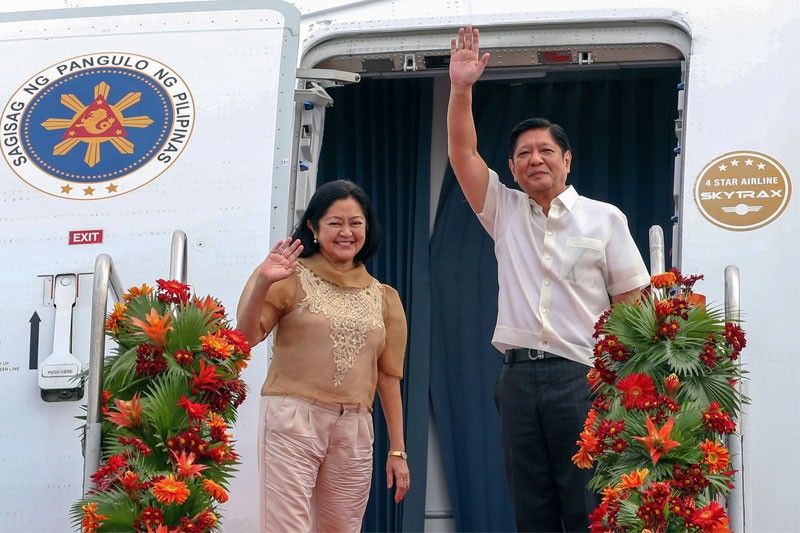Philippines' balancing act: Independence while maintaining 'complex' relationships

MANILA, Philippines — The US has reaffirmed its support for the defense of its former colony and current ally partner but analysts underscore that the decades-old alliance is not the "be all and end all" of Philippine foreign policy.
Manila’s next challenge — as it pursues its diplomatic thrust of being a "friend to all, enemy to none" — is to balance the "two great powers" in the region. Mark Manantan, director of cybersecurity and critical technologies at foreign policy research institute Pacific Forum International, said trying to get concessions from both the US and China is going to be the country’s new normal.
"Given its limited diplomatic and defense resources, complex political economic and security ties with Beijing and Washington DC, Manila should be able to adopt a more pragmatic yet forward thinking approach to its foreign policy-making given the unpredictability of the regional security environment," Manantan told Philstar.com in a WhatsApp message.
According to a US Department of Defense readout dated February 3, the US and the Philippines have "agreed to restart" joint maritime patrols in the South China Sea — part of which is the West Philippine Sea — to help Manila with regional security challenges.
This comes after the visit of US Defense Secretary Lloyd Austin to the Philippines. While in Manila, he met with President Ferdinand “Bongbong” Marcos Jr., counterpart Defense Secretary Carlito Galvez Jr. and other Philippine officials and reaffirmed Washington’s commitment to its oldest treaty ally in Southeast Asia.
READ: Biden wants stronger ties with Philippines under Marcos after ‘rocky times’
Marcos has also approved the addition of four sites in "strategic areas" for coverage under the Enhanced Defense Cooperation Agreement, which means US military can soon have access to nine Philippine military facilities.
Officials have yet to announce specific locations as Defense Secretary Galvez also noted that they are still in talks with the local governments and communities of the proposed sites. However, Manantan said the expansion of the EDCA could help the country in its fight against terrorism and its disaster response program, as well as look into opportunities in cybersecurity and hybrid warfare.
Regional effects
China, through its embassy in Manila, said that recent actions and statements made during Austin’s visit "undermine regional peace and stability." The embassy also accused Washington of smearing Beijing when it comes to the issue of the South China Sea.
READ: China accuses US of countering peace in expanding access to Philippines bases
Meanwhile, the US adding more of its military presence in the Philippines is also seen as a way to deter China’s advances towards Taiwan.
"To maintain the status quo in the cross-straits, it has to build trust and confidence that it will stand with the Philippines in dealing with its security concerns in the West Philippine Sea," Julio Amador III, interim president of the Foundation for the National Interest, told Philstar.com.
READ: What the Philippines can learn from China's reaction to Pelosi's Taiwan visit
Austin’s visit came just weeks after Marcos had his first state visit to China, where the Philippines inked over 10 agreements that includes putting up a communication line to help iron out issues in the West Philippine Sea.
Philippines-US-Japan partnership possible?
Amador noted the government is "trying to manage" big maritime security issues by improving the Philippines' relationship with China whil also managing relationships and alliances with other countries.
He added that recent developments such as the continuation of joint patrols with Washington and a communication line with Beijing all highlight Manila’s need for legislation that implements and echoes the 1982 United Nations Convention on the Law of the Sea.
"This would legislate the portions of that treaty allocating maritime zones to the coastal state, as to their geographical extent and their legal regime," Amador said.
Lawmakers have proposed the creation of a Philippine Maritime Zones Act, which would define and delimit the territorial boundaries in disputed waters, including the West Philippine Sea.
Meanwhile, Manantan noted recent developments may pave the way for further cooperation among the US, Japan, and the Philippines. Marcos and a number of Philippine officials will be in Japan this week for an official working visit.
"[The Philippines will] negotiate or discuss an acquisition and cross-servicing agreement and a reciprocal access agreement (RAA). Taking the combined impact of these initiatives with the expansion of US bases through EDCA and the Philippine negotiations with Japan on [the] RAA, a trilateral US-Japan-Philippines [agreement] can potentially be realized," Manantan said.
READ: US, Japan recognize landmark South China Sea ruling
--
- Latest
- Trending





























